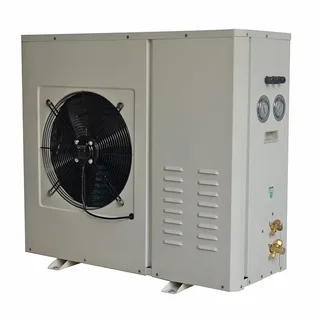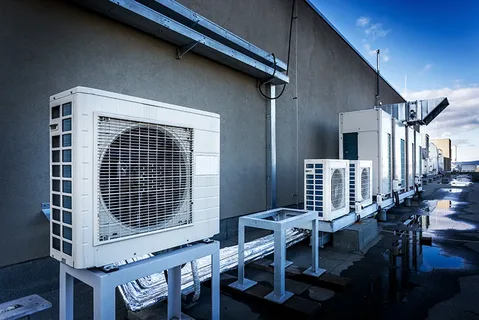When it comes to creating a healthy and comfortable indoor environment, air quality plays a crucial role. One way to ensure that the air in your home is clean and fresh is by utilizing an air exchange unit system. In this blog post, we will explore the various benefits of air exchange units and how they can improve your health and overall comfort.
Understanding Air Exchange Systems
Air exchange systems are engineered to facilitate a continuous air flow within your home, ensuring that indoor environments are kept at optimal air quality levels. By systematically replacing the air inside with fresh, outdoor air, these units play a crucial role in maintaining a clean and healthful atmosphere.
The operation of air exchange systems is marked by their ability to cycle the indoor air multiple times an hour. This persistent circulation ensures that the air you breathe is consistently refreshed, significantly reducing the presence of indoor air pollutants and unpleasant odours.
These systems are adept at handling the air quality needs of modern homes, where energy-efficient designs can often lead to less natural ventilation and increased accumulation of airborne contaminants. By addressing the issue of stagnant air, air exchange systems ensure that occupants are provided with a steady supply of oxygen-enriched air from outside, thus enhancing the living environment. This is particularly beneficial in settings with good external air quality, allowing the system to introduce clean air free of the pollutants commonly found in indoor settings.
Moreover, strategically replacing indoor air with outdoor air prevents excessive moisture buildup, which can lead to mould and mildew problems if left unaddressed. This process not only helps in maintaining the structural integrity of your home but also supports the well-being of its occupants by fostering an environment that is less conducive to allergens and respiratory irritants.
 Enhancing Indoor Air Quality with Air Exchanger
Enhancing Indoor Air Quality with Air Exchanger
An air exchanger‘s contribution to enhancing indoor air quality cannot be overstated. These systems excel in diminishing the levels of harmful pollutants within your home, fostering a cleaner, healthier environment. They proficiently manage to dilute particulate matter concentrations, including fine dust particles, pet dander, and a variety of volatile organic compounds (VOCs) emitted from paints, cleaning supplies, and other household items.
The constant introduction of fresh air and expulsion of potentially contaminated indoor air assists in mitigating the health risks associated with long-term exposure to indoor air pollutants. This is particularly advantageous for individuals suffering from asthma, allergies, or other respiratory issues, as it can significantly reduce their symptoms and improve their quality of life.
Furthermore, the operation of an air exchanger supports the balance of indoor humidity levels, indirectly contributing to air quality. By preventing the air from becoming too humid or too dry, it creates a more hospitable environment, discouraging the proliferation of dust mites and other allergens.
This specialized ventilation approach ensures that your living space is comfortable and promotes a healthier lifestyle. Through strategically replacing stale indoor air with filtered outdoor air, air exchangers play an indispensable role in maintaining the purity of your home’s atmosphere.
The Role of Air Exchange System in Preventing Mold Growth
Regulating Humidity Levels
Air exchange system adeptly maintains humidity within optimal ranges, which is crucial in thwarting mold’s growing ability. Excessive moisture is systematically removed, preventing the damp conditions mold thrives in.
Continuous Air Circulation
By promoting constant air flow, these systems ensure that moist air does not become stagnant in any area of the home. This continuous circulation helps to dry out potential wet spots where mold might otherwise take hold.
Filtration of Incoming Air
Modern air exchange units often include filtration capabilities, capturing spores and other particulates from incoming air. This reduces the number of mold spores that enter the indoor environment, decreasing the potential for mold growth.
Reduction of Condensation
By balancing indoor and outdoor air temperatures, air exchange systems minimize the occurrence of condensation on windows, walls, and other surfaces. This lessens the moisture available for mould proliferation.
Improved Overall Air Quality
While enhancing indoor air quality by removing pollutants and allergens, these systems also indirectly combat mould growth by creating an inhospitable environment for spores to settle and multiply.
Energy Efficiency and Cost Savings
Reduced Energy Consumption
Air exchange systems, especially those with heat recovery features, are designed to minimize energy loss. By reclaiming heat from the exhaust air before it’s expelled, these systems require less energy to heat the incoming fresh air, significantly reducing heating costs during the colder months.
Optimized HVAC Performance
With the continuous introduction of fresh air and the removal of stale air, air exchange units help maintain an optimal indoor environment. This reduces the burden on heating, ventilation, and air conditioning (HVAC) systems, allowing them to operate more efficiently and with less wear and tear over time, ultimately saving on maintenance and replacement costs.
Smart Technology Integration
Modern air exchange systems can be integrated with smart home technology, enabling homeowners to precisely control and optimize their operation. This allows energy use to be tailored to the household’s schedule, preventing unnecessary operation and reducing energy consumption.
Improved Airflow Regulation
By ensuring a steady exchange of indoor and outdoor air, these systems help prevent the buildup of humidity and pollutants. This improves health and comfort and allows the thermostat to be set at a more constant, energy-efficient temperature, avoiding the energy spikes associated with frequent heating and cooling adjustments.
Eligibility for Energy Rebates
Homeowners who install energy-efficient air exchange systems may be eligible for government or utility rebates and incentives. These programs are designed to encourage energy efficiency improvements, offering upfront cost reductions and making installing an air exchange system more affordable.
Residential Air Exchanger Contributes to a Comfortable Living Environment
Implementing a residential air exchanger is pivotal in creating a serene and welcoming home atmosphere. These systems adeptly manage the ingress of fresh, clean air and the egress of stale, polluted air, ensuring consistent comfort throughout your living spaces. The nuanced control over air quality and humidity eliminates the discomfort of stuffy, odorous air and maintains an environment that feels naturally fresh and invigorating.
Residents enjoy a sense of renewal, with air revitalising rather than detracting from their home’s comfort. Furthermore, by integrating seamlessly with existing HVAC systems, air exchangers contribute to a uniform temperature across different rooms, eliminating hot or cold spots that can disrupt the comfort of your home.
This harmonious balance of temperature and air quality makes every corner of your house more enjoyable and livable. Whether relaxing in the living room, cooking in the kitchen, or resting in the bedroom, a residential air exchanger subtly enhances the living experience, making your home a true sanctuary.
Air Exchanger for House and Sleep Quality Improvement
Improving sleep quality is another significant benefit of installing an air exchanger for house. The constant air renewal ensures the bedroom environment is optimal for restful sleep. By reducing carbon dioxide levels and flushing out pollutants and allergens, air exchangers create a cleaner breathing space, crucial for uninterrupted sleep.
High levels of indoor pollutants exacerbate respiratory conditions and discomfort, leading to frequent awakenings and poor sleep quality. Additionally, by maintaining balanced humidity levels, air exchangers prevent the air from becoming too dry or too moist. Dry air can irritate the respiratory system and skin, while overly moist air can make the environment feel stuffy and uncomfortable, further disrupting sleep.
A comfortable sleeping environment, with fresh, clean air, supports the body’s natural sleep cycle and promotes deeper, more restorative sleep phases. This is particularly beneficial for individuals with allergies, asthma, or other conditions that are sensitive to air quality. An air exchanger for the house, therefore, enhances the overall living conditions and specifically contributes to the vital aspect of sleep quality, ensuring that nights are as refreshing as days.
Long-term Health Benefits
Reduced Respiratory Problems
Consistent use of an air exchange system can significantly lower the incidence of respiratory issues over time. Individuals with asthma or allergies can experience fewer symptoms and exacerbations by continuously filtering out allergens, dust, and pollutants.
Enhanced Immune Function
Improved air quality can bolster the immune system’s effectiveness. A cleaner living environment minimizes the exposure to harmful pathogens and chemicals that can weaken the immune system, thus offering better defense against illnesses.
Lower Risk of Chronic Diseases
Long-term exposure to indoor air pollutants is linked to an increased risk of certain chronic diseases, including heart disease and lung cancer. Regular air exchange helps to minimize these risks by maintaining a cleaner air environment.
Better Cognitive Function
There’s emerging evidence to suggest that air quality can significantly impact cognitive function and mental health. Cleaner air can improve concentration, productivity, and mood, improving overall mental health and function.
Improved Sleep Quality and Life Expectancy
While briefly touched upon, the positive impact of cleaner air on sleep quality can also lead to long-term health benefits, including potentially increased life expectancy. Consistently good sleep is closely linked to overall health, reducing stress, and mitigating risk factors associated with various health conditions.
Conclusion
Wrapping up, installing an air exchange unit presents a comprehensive solution to enhance the livability and healthfulness of your home environment. Its advanced functionality ensures a consistent flow of clean air, mitigates harmful pollutants and maintains comfortable humidity and temperature levels. The benefits extend from immediate comfort improvements to long-term health advantages, including better respiratory health, enhanced immune function, and improved sleep quality. Such systems contribute to a more enjoyable living space and support the well-being of all occupants. If questions remain about integrating an air exchange system into your home or its specific benefits, consulting with an HVAC expert can provide tailored advice and insights based on your unique needs.
FAQs
Can air exchange units help with allergies?
Air exchange units can significantly help individuals with allergies by continuously filtering out common allergens such as pollen, dust mites, and pet dander from the indoor air, providing a cleaner breathing environment.
How often do air exchange systems need maintenance?
Typically, air exchange systems should be inspected and maintained at least once a year to ensure optimal performance. This may include cleaning or replacing filters and checking the system for potential issues.
Do air exchange units work in all climates?
Air exchange units are designed to work in various climates by adjusting the balance between indoor and outdoor air to maintain comfortable living conditions, regardless of the weather outside.
Are air exchange systems energy-efficient?
Modern air exchange systems are designed with energy efficiency in mind, often including features like heat recovery to minimize energy consumption while maintaining a constant fresh air flow.
Will an air exchange system make my home too dry or too humid?
No, part of the function of an air exchange system is to balance humidity levels, ensuring that your home does not become too dry in the winter or too humid in the summer.
| Other Good Articles to Read |
| Skank Blogs |
| Unreal Blogs |
| Tba Blogs |
| All City Forums |
| Dany Blogs |
| Refuge Blogs |
| The Music Blogs |
| Key Forums |
| The Big Blog Theory |
| Joe Blogs |
| Blogs 4 Me |
| Blogs Emon |
| Related Business Listings |
| Contact Directory |
| Local Business Profiles |



